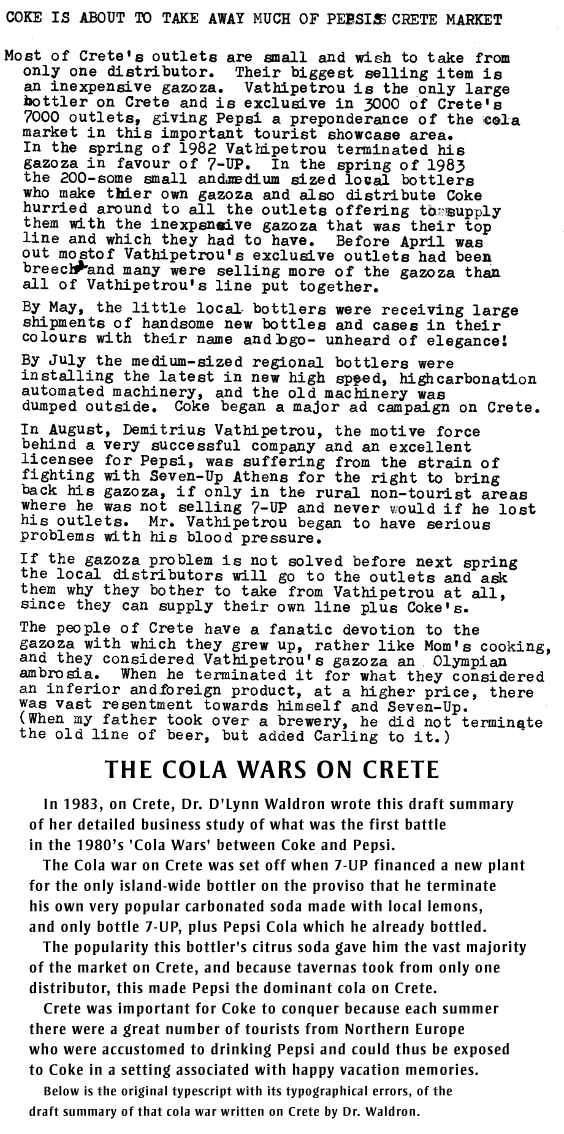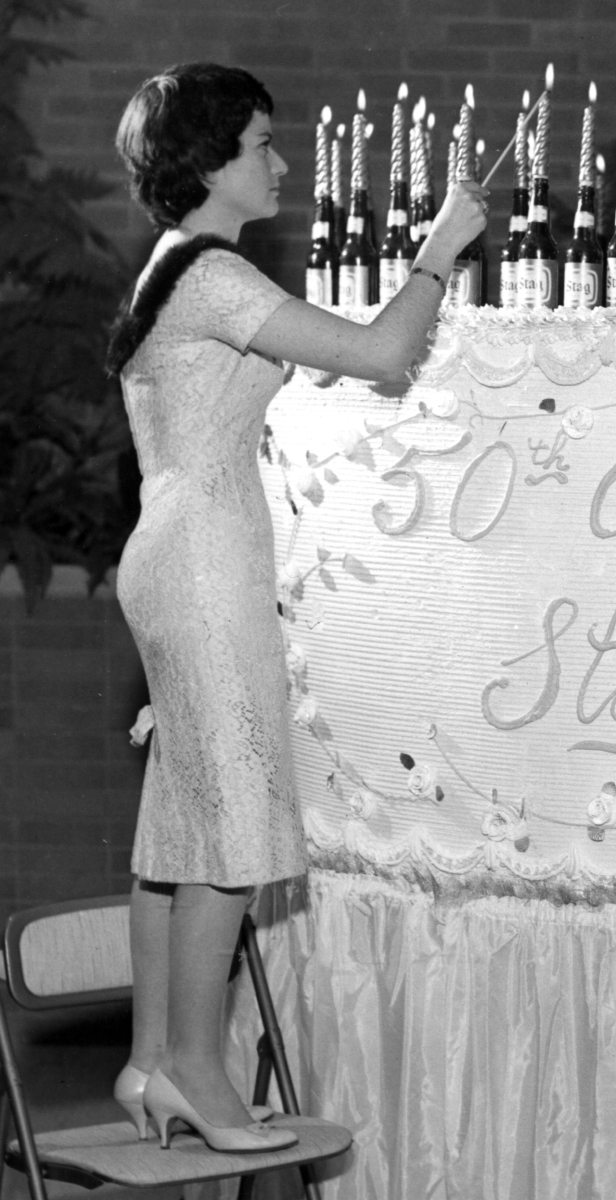
THE COLA WARS ON CRETE
article by D'Lynn Waldron, PhD. copyright 2002
Part of the cost of Dr. Waldron's ethnographic research in Spain and on Crete was paid for by doing market analyses for 7-UP soft drink, which was being added to local beverages by an American company that had just brought the worldwide ownership of 7-UP, that they franchised to local bottlers. A soft drink was a new product line for this American company, which was using cash it had in Greece for a new, modern bottling plant for the local bottler, Vathipetrou, who had the Pepsi franchise and his own much-loved soda made with local lemons.
This American company gave Crete's only major soft drink company, Vathipetrou, the money to build a modern bottling plant for 7-UP which they were introducing and the Pepsi they were already bottling on franchise.
The American company, to maximize its profits, told Vathipetrou they could no longer bottle Crete's favorite local soft drink, Vathipetrou's 'gazoza' made from fresh Cretan lemons, but could only bottle 7-Up which was made from an imported syrup that had only a small amount of fruit juice
The popularity of this bottler's fresh lemon soda gave him the vast majority of the market on Crete. Because tavernas took from only one distributor, this made Pepsi the dominant cola on Crete.
Coca Cola very much wanted to take over the market on Crete because Pepsi was the popular cola in the Northern European countries from which tourists came, and Coca Cola wanted those tourists to associate their holiday with Coke when they got back home.
Dr. Waldron tried to convince the American company that ending the production of Crete's own favorite soft drink, which was the only siginificant market for the locally grown lemons, would turn the people of Crete against Vathipetrou. (And, the tourists would prefer 7-UP, a brand they knew internationally.)
Because the tavernas took from only one company, Vathipetrou and Pepsi were about to lose their market on Crete to Coca Cola, which had recognized its opportunuity and was already preparing to take over the market with a new bottling plant for CocaCola. For the small village bottlers of their own (delicious!) fresh lemon soda, CocaCola made them a gift of new bottles and caps and cases with the village bottler's name on them. Up to now, these bottlers had been using any old bottles they could find for the lemon soft drink that they hand delivered to their village's tavernas. This fresh lemon softdrink was enjoyed the same day and the bottles picked up to be refilled.
The American company did not listen. Dr. Waldron lost her consultant work for 7-UP. Vathipetrou lost his market share (and his health) in what was the first of the International Cola Wars. A few years leter, the American company's money losing 7-UP ownership was sold at a loss. However, they learned their lesson with 7-UP and have since acquired many iconic American and international food companies, to become one of the largest conglomerates in the world.
Below is a scan of the typescript the summary of the Cola Wars on Crete which Dr. D'Lynn Waldron sent in 1983 to the people in charge at the American company's NYC headquaerters.
An amusing story: There was a small bottling company in a mountain village on Crete that was having success with its soft drink made with fresh lemons grown on Crete. Their product used the name Vathipetrou after the town,which was famed for the water from its spring, that was used in the soda. When the bottling was moved to the coast, the company continued to use the name Vathipetrou. The mountain village sued. The company owners asked the judge if they could use their own name. The judge ruled of course they could use their own name. The judge was then given the legal documents with which the family had changed its name to Vathipetrou
EXPLANATION FOR DR. WALDRON'S KNOWLEDGE OF THE BEVERAGE INDUSTRY: D'Lynn Waldron is the daughter of George E. Waldron a principal developer before WW II of safety equipment while plant manager for Hoffman Beverages. After WW II, as manager for Schaefer Brewery and then the Carling Breweries, he designed the modern high speed bottling and canning lines. From the time she was a toddler, he took her every 'half day Saturday' to the plant. Following WW II, after checking on the plant and explaining everything to his daughter, they went to one of the sports events to which as radio and then TV sponsors, they got complementary tickets. All aspects of the beverage business was their dinnertable discussion. By the time she was ten, his daughter was writing his trade show talks on such things as palletizing. In his old age, George Waldron was a member of the Rockefeller Senior Executive Corps advising on beverage production in Asia, North Africa and South America and he discussed with his daughter the problems he had to solve. D'Lynn had in Spain and Crete a lifetime of knowledge about all aspects of the beverage business. Had she been born in a later generation, she would have followed her father in the business.
CRETE PHOTOGRAPHS BY D'LYNN WALDRON
 .
.

One of the breweries bought by Carling and managed by George Waldron made Stag Beer and here D'Lynn Waldron is lighting the candles for its 50th Anniversary celebration. (This is the dress she was wearing to dinner in Stanleyville, Belgian Congo, that caused a fellow American to remark, "It would take a damn American to wear a damn mink in the damn jungle.")

 .
.
